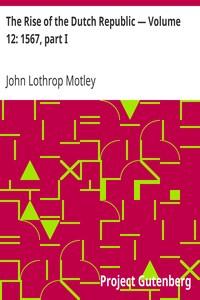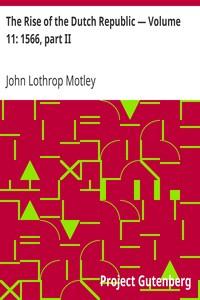|
|
Read this ebook for free! No credit card needed, absolutely nothing to pay.Words: 184175 in 22 pages
This is an ebook sharing website. You can read the uploaded ebooks for free here. No credit cards needed, nothing to pay. If you want to own a digital copy of the ebook, or want to read offline with your favorite ebook-reader, then you can choose to buy and download the ebook.

: The Rise of the Dutch Republic — Complete (1566-74) by Motley John Lothrop - Netherlands History Eighty Years' War 1568-1648; Netherlands Church history@FreeBooksTue 06 Jun, 2023 MOTLEY'S HISTORY OF THE NETHERLANDS, PG EDITION, 1566-1574, Complete THE RISE OF THE DUTCH REPUBLIC VOLUME 2, Book 1., 1566 1566 Secret policy of the government--Berghen and Montigny in Spain-- Debates at Segovia--Correspondence of the Duchess with Philip-- Procrastination and dissimulation of the King--Secret communication to the Pope--Effect in the provinces of the King's letters to the government--Secret instructions to the Duchess--Desponding statements of Margaret--Her misrepresentations concerning Orange, Egmont, and others--Wrath and duplicity of Philip--Egmont's exertions in Flanders--Orange returns to Antwerp--His tolerant spirit--Agreement of 2d September--Horn at Tournay--Excavations in the Cathedral--Almost universal attendance at the preaching-- Building of temples commenced--Difficult position of Horn--Preaching in the Clothiers' Hall--Horn recalled--Noircarmes at Tournay-- Friendly correspondence of Margaret with Orange, Egmont, Horn, and Hoogstraaten--Her secret defamation of these persons. Egmont in Flanders, Orange at Antwerp, Horn at Tournay; Hoogstraaten at Mechlin, were exerting themselves to suppress insurrection and to avert ruin. What, meanwhile, was the policy of the government? The secret course pursued both at Brussels and at Madrid may be condensed into the usual formula--dissimulation, procrastination, and again dissimulation. It is at this point necessary to take a rapid survey of the open and the secret proceedings of the King and his representatives from the moment at which Berghen and Montigny arrived in Madrid. Those ill-fated gentlemen had been received with apparent cordiality, and admitted to frequent, but unmeaning, interviews with his Majesty. The current upon which they were embarked was deep and treacherous, but it was smooth and very slow. They assured the King that his letters, ordering the rigorous execution of the inquisition and edicts, had engendered all the evils under which the provinces were laboring. They told him that Spaniards and tools of Spaniards had attempted to govern the country, to the exclusion of native citizens and nobles, but that it would soon be found that Netherlanders were not to be trodden upon like the abject inhabitants of Milan, Naples, and Sicily. Such words as these struck with an unaccustomed sound upon the royal ear, but the envoys, who were both Catholic and loyal, had no idea, in thus expressing their opinions, according to their sense of duty, and in obedience to the King's desire, upon the causes of the discontent, that they were committing an act of high treason. When the news of the public preaching reached Spain, there were almost daily consultations at the grove of Segovia. The eminent personages who composed the royal council were the Duke of Alva, the Count de Feria, Don Antonio de Toledo, Don Juan Manrique de Lara, Ruy Gomez, Quixada, Councillor Tisnacq, recently appointed President of the State Council, and Councillor Hopper. Six Spaniards and two Netherlanders, one of whom, too, a man of dull intellect and thoroughly subservient character, to deal with the local affairs of the Netherlands in a time of intense excitement! The instructions of the envoys had been to represent the necessity of according three great points--abolition of the inquisition, moderation of the edicts, according to the draft prepared in Brussels, and an ample pardon for past transactions. There was much debate upon all these propositions. Philip said little, but he listened attentively to the long discourses in council, and he took an incredible quantity of notes. It was the general opinion that this last demand on the part of the Netherlanders was the fourth link in the chain of treason. The first had been the cabal by which Granvelle had been expelled; the second, the mission of Egmont, the main object of which had been to procure a modification of the state council, in order to bring that body under the control of a few haughty and rebellious nobles; the third had been the presentation of the insolent and seditious Request; and now, to crown the whole, came a proposition embodying the three points--abolition of the inquisition, revocation of the edicts, and a pardon to criminals, for whom death was the only sufficient punishment. With regard to these three points, it was, after much wrangling, decided to grant them under certain restrictions. To abolish the inquisition would be to remove the only instrument by which the Church had been accustomed to regulate the consciences and the doctrines of its subjects. It would be equivalent to a concession of religious freedom, at least to individuals within their own domiciles, than which no concession could be more pernicious. Nevertheless, it might be advisable to permit the temporary cessation of the papal inquisition, now that the episcopal inquisition had been so much enlarged and strengthened in the Netherlands, on the condition that this branch of the institution should be maintained in energetic condition. With regard to the Moderation, it was thought better to defer that matter till, the proposed visit of his Majesty to the provinces. If, however, the Regent should think it absolutely necessary to make a change, she must cause a new draft to be made, as that which had been sent was not found admissible. Touching the pardon general, it would be necessary to make many conditions and restrictions before it could be granted. Provided these were sufficiently minute to exclude all persons whom it might be found desirable to chastise, the amnesty was possible. Otherwise it was quite out of the question. Meantime, Margaret of Parma had been urging her brother to come to a decision, painting the distracted condition of the country in the liveliest colors, and insisting, although perfectly aware of Philip's private sentiments, upon a favorable decision as to the three points demanded by the envoys. Especially she urged her incapacity to resist any rebellion, and demanded succor of men and money in case the "Moderation" were not accepted by his Majesty. It was the last day of July before the King wrote at all, to communicate his decisions upon the crisis which had occurred in the first week of April. The disorder for which he had finally prepared a prescription had, before his letter arrived, already passed through its subsequent stages of the field-preaching and the image-breaking. Of course these fresh symptoms would require much consultation, pondering, and note-taking before they could be dealt with. In the mean time they would be considered as not yet having happened. This was the masterly procrastination of the sovereign, when his provinces were in a blaze. His masterly dissimulation was employed in the direction suggested by his councillors. Philip never originated a thought, nor laid down a plan, but he was ever true to the falsehood of his nature, and was indefatigable in following out the suggestions of others. No greater mistake can be made than to ascribe talent to this plodding and pedantic monarch. The man's intellect was contemptible, but malignity and duplicity, almost superhuman; have effectually lifted his character out of the regions of the common-place. He wrote accordingly to say that the pardon, under certain conditions, might be granted, and that the papal inquisition might cease--the bishops now being present in such numbers, "to take care of their flocks," and the episcopal inquisition being, therefore established upon so secure a basis. He added, that if a moderation of the edicts were still desired, a new project might be sent to Madrid, as the one brought by Berghen and Montigny was not satisfactory. In arranging this wonderful scheme for composing the tumults of the country, which had grown out of a determined rebellion to the inquisition in any form, he followed not only the advice, but adopted the exact language of his councillors. Certainly, here was not much encouragement for patriotic hearts in the Netherlands. A pardon, so restricted that none were likely to be forgiven save those who had done no wrong; an episcopal inquisition stimulated to renewed exertions, on the ground that the papal functionaries were to be discharged; and a promise that, although the proposed Moderation of the edicts seemed too mild for the monarch's acceptance, yet at some future period another project would be matured for settling the matter to universal satisfaction--such were the propositions of the Crown. Nevertheless, Philip thought he had gone too far, even in administering this meagre amount of mercy, and that he had been too frank in employing so slender a deception, as in the scheme thus sketched. He therefore summoned a notary, before whom, in presence of the Duke of Alva, the Licentiate Menchaca and Dr. Velasco, he declared that, although he had just authorized Margaret of Parma, by force of circumstances, to grant pardon to all those who had been compromised in the late disturbances of the Netherlands, yet as he had not done this spontaneously nor freely, he did not consider himself bound by the authorization, but that, on the contrary, he reserved his right to punish all the guilty, and particularly those who had been the authors and encouragers of the sedition. So much for the pardon promised in his official correspondence. Free books android app tbrJar TBR JAR Read Free books online gutenberg More posts by @FreeBooks
: The Rise of the Dutch Republic — Volume 12: 1567 part I by Motley John Lothrop - Netherlands History Eighty Years' War 1568-1648; Netherlands Church history@FreeBooksTue 06 Jun, 2023

: The Rise of the Dutch Republic — Volume 11: 1566 part II by Motley John Lothrop - Netherlands History Eighty Years' War 1568-1648; Netherlands Church history@FreeBooksTue 06 Jun, 2023
|
Terms of Use Stock Market News! © gutenberg.org.in2025 All Rights reserved.






